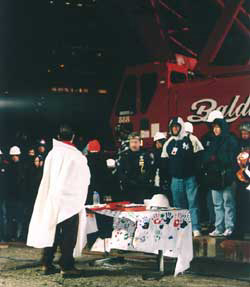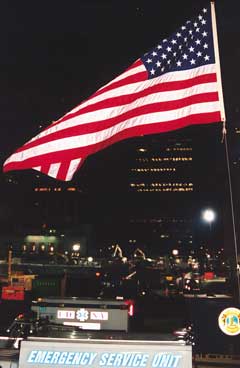
Need Help?
Email or Call: 1-800-577-4762
Email or Call: 1-800-577-4762


Sign up for our
NEWSLETTER
NEWSLETTER
Need Help?
CONTACT US
CONTACT US

9/11 One Year Later: A Psychotherapist Reflects on His Experiences at Ground Zero
Filed Under: Trauma/PTSD
In This Article…
As we pass the one year anniversary of the terrorist attacks of September 11, 2001, Americans are reflecting on the toll this event has taken on our collective consciousness. Due in large part to the power of the media to magnify this spectacle to epic proportions, it is arguably the most traumatizing event in post-modern times. As mental health professionals, we can witness the reverberations of 9/11 from a unique vantage point. Although clients in my private practice have rarely cited the terrorist attacks as a presenting problem, there was clearly a great deal of thought and energy devoted to reassessing priorities and choices. In the first month following the attacks, it was impossible for me to conduct a psychotherapy session without acknowledging the tragedy. My clients and I had a rare opportunity to share moments of mutual empathy that deviated from the usual limits of the therapeutic relationship.
Despite this, my professional activities felt inadequate in addressing my own need to do something more in response to 9/11. When a colleague told me of her positive experience as a Red Cross disaster mental health volunteer, and the need for assistance with the relief effort in New York City, I felt drawn, compelled, to join. After completing the orientation and training classes provided by the Red Cross, I found myself reconnecting with the idealism and passion that first attracted me to human service.
Arriving in Manhattan
I arrived in New York on 12/19/01 ready to do my part. I completed the necessary in-processing at headquarters and took a cab to the hotel room provided by the Red Cross in midtown Manhattan. Negotiating subways, cabs, and crosswalks was challenging at first, but I was soon able to pick up a bagel and coffee and make it to the downtown A-train without being late to my destination.
Getting to know the city firsthand helped me appreciate the changes that had occurred since 9/11. I was told that in the aftermath of the disaster, New Yorkers became more open than usual, with some people actually talking to strangers on the subway. Those I encountered were genuinely appreciative of the volunteers from out of town, expressing an uncharacteristic sense of their vulnerability, and need for assistance. The 9/11 attacks made us all painfully aware of the limits of our technological infrastructure, and the fragility of our human bonds.
 |
How Ground Zero Stretched the Therapeutic Role
It became clear early on that the workers were making a great effort to suppress their emotions in order to carry out their difficult tasks. Almost all of the workers had lost at least one friend or colleague in the World Trade Center. In this intensely chaotic yet controlled environment, the appropriate role of mental health volunteers was to engage Ground Zero workers in a delicate dance between small talk and existential validation. It felt as if we were there primarily to bear witness to the experiences of the Ground Zero workers, as they endured 12-hour shifts recovering human remains, struggling to keep their exhaustion and grief from interfering with the mission.
Balancing this unconventional therapeutic role, alternating between schmoozing and debriefing, proved to be terribly fatiguing at first. It was a stretch from the more evocative style of my mental health practice. At times, I felt as if I was carrying the unexpressed grief of the recovery workers back to my hotel room every night as I searched myself for the empathic response to their ordeal. Processing my experiences on a daily basis with other disaster mental health volunteers rewarded me with the awareness that our mere presence at Ground Zero was our greatest contribution to the workers there.
We weren't expected to have any words of wisdom... and nobody did.
We weren't expected to have any words of wisdom... and nobody did.
Some of my disaster mental health colleagues in New York worked with family members of victims who were openly grieving and verbalizing their experiences. My assignment at Ground Zero was quite the opposite; in fact, it may have been the location in Manhattan where one was least likely to witness the venting of feelings.
Herculean Efforts and Unexpressed Sorrow
Being present in this hallowed ground, with the sound of heavy equipment, and the smell of combustion and decomposition ever present, was a trying task for everyone there. The Herculean effort of the recovery workers, to postpone their natural emotional response, was both impressive and poignant. A group of firefighters sat at a table, laughing and joking about some trivial issue, after hours of raking through the piles of debris in search of missing colleagues. One police officer, who led his cadaver dog into the pit to assist in the locating of bodies, told me of the difficulty of suppressing the horrible images he encountered when he returned home to his wife and children. A fire captain solemnly acknowledged to me that, even after three months, the recovery workers were driven by the desperate hope that, somewhere in the six-acre pit, a living soul was waiting to be rescued.
 |
I had never felt such a heaviness of unexpressed sorrow, though it resonated deeply with my own personal family losses prior to 9/11. My evocative skills were not useful at Ground Zero... I felt burdened, at times, with the violence and trauma that was ever-present yet still mostly unprocessed. Over my two weeks in lower Manhattan, my PTSD response took the form of sleeplessness and fatigue. Yet, too, I was surprised at the absence of nightmares that I had expected would occur. Perhaps the daytime witnessing of horrors made such nightmares superfluous.
Leaving Manhattan... Returning Home
The practical function of the disaster mental health professional at Ground Zero was as a vessel, or conduit of pain to facilitate the recovery work; I knew that I would have to carry my share of it home with me.
The Red Cross cautioned the volunteers that when we returned home people would ask about our experiences. They suggested that we would find it difficult or impossible to convey our true feelings and experiences to those who had not been there. That was indeed an understatement! Even here, in writing this account, do I find it so hard, so inexplicably difficult to express my experiences fully.
As the days and weeks passed, I felt more and more as if I had walked away from a battleground—with all the grief, psychic numbing, and survivor guilt that goes with such trauma. Indeed, I had walked away from a battleground—it was not "just a feeling." I had crossed the line between observer and participant, and no professional objectivity would suffice. My mental health colleagues and anyone else who ventured close to the unprecedented injury and destruction of the 9/11 attacks knows of what I speak.
This ineffable experience is captured best, not in any words, no matter how well expressed, but in the silent glances between workers, the hugs of those that care, the hope of those who courageously carry on in spite of loss and despair.
This ineffable experience is captured best, not in any words, no matter how well expressed, but in the silent glances between workers, the hugs of those that care, the hope of those who courageously carry on in spite of loss and despair.
Despite the routine debriefings provided by the Red Cross, I left New York with more than a lifetime's worth of intense images and sensations. I intuitively knew that my disaster mental health experience would be life-changing, but I did not know exactly how.
At first my clinical practice felt boring in contrast to what I had witnessed in New York.I felt different, as if I had expanded, or gained access to parts of my own life that I had not seen before. At first my clinical practice felt boring in contrast to what I had witnessed in New York. I found myself reaching to find the relevance in the complaints of the worried well, which suddenly felt terribly trivial. My style shifted, temporarily, to a less patient, more emphatic "let's get on with it" tempo. I soon became aware that I was unwittingly projecting my need for catharsis onto my clients. This awareness was the first step in beginning to understand what all this meant to me. I too, needed to know and understand my feelings, to express and share my fears and sorrows, and take the risk at experiencing catharsis in my own life.
Opportunities to share my disaster mental health experience, both publicly and privately, have given perspective to my images of Ground Zero, and grounding to my emotions. I feel more vitally connected to my soul and less attached to old assumptions. My work has settled into a serenely energized stance. Now, when I am sitting with my clients, I feel that we are more in touch with each other's humanity than before-or rather, more than I had previously allowed.
At Ground Zero, my instincts were all I had to work with; they have since become my most valuable therapeutic resource.
Copyright © 2002 Psychotherapy.net. All rights reserved.
 Tab Ballis is a Licensed Clinical Social Worker and Clinical Addictions Specialist in private practice in the coastal town of Wilmington, North Carolina. Tab's clinical philosophy can best be summed up by John Updike, who wrote, "Life has a way of punishing you if you take it too seriously, or not seriously enough." Conscious Creativity, his unique approach to enhancing creativity, has been well-received by artists and professional groups. Tab produced the videotape Tools and Techniques for Family Therapy, which is offered on this website. His practice website is www.insightwellnessservices.com. Tab can be contacted at info@insightwellnessservices.com.
Tab Ballis is a Licensed Clinical Social Worker and Clinical Addictions Specialist in private practice in the coastal town of Wilmington, North Carolina. Tab's clinical philosophy can best be summed up by John Updike, who wrote, "Life has a way of punishing you if you take it too seriously, or not seriously enough." Conscious Creativity, his unique approach to enhancing creativity, has been well-received by artists and professional groups. Tab produced the videotape Tools and Techniques for Family Therapy, which is offered on this website. His practice website is www.insightwellnessservices.com. Tab can be contacted at info@insightwellnessservices.com.
Tab Ballis was compensated for his/her/their contribution. None of his/her/their books or additional offerings are required for any of the Psychotherapy.net content. Should such materials be references, it is as an additional resource.
Psychotherapy.net defines ineligible companies as those whose primary business is producing, marketing, selling, re-selling, or distributing healthcare products used by or on patients. There is no minimum financial threshold; individuals must disclose all financial relationships, regardless of the amount, with ineligible companies. We ask that all contributors disclose any and all financial relationships they have with any ineligible companies whether the individual views them as relevant to the education or not.
Additionally, there is no commercial support for this activity. None of the planners or any employee at Psychotherapy.net who has worked on this educational activity has relevant financial relationship(s) to disclose with ineligible companies.

